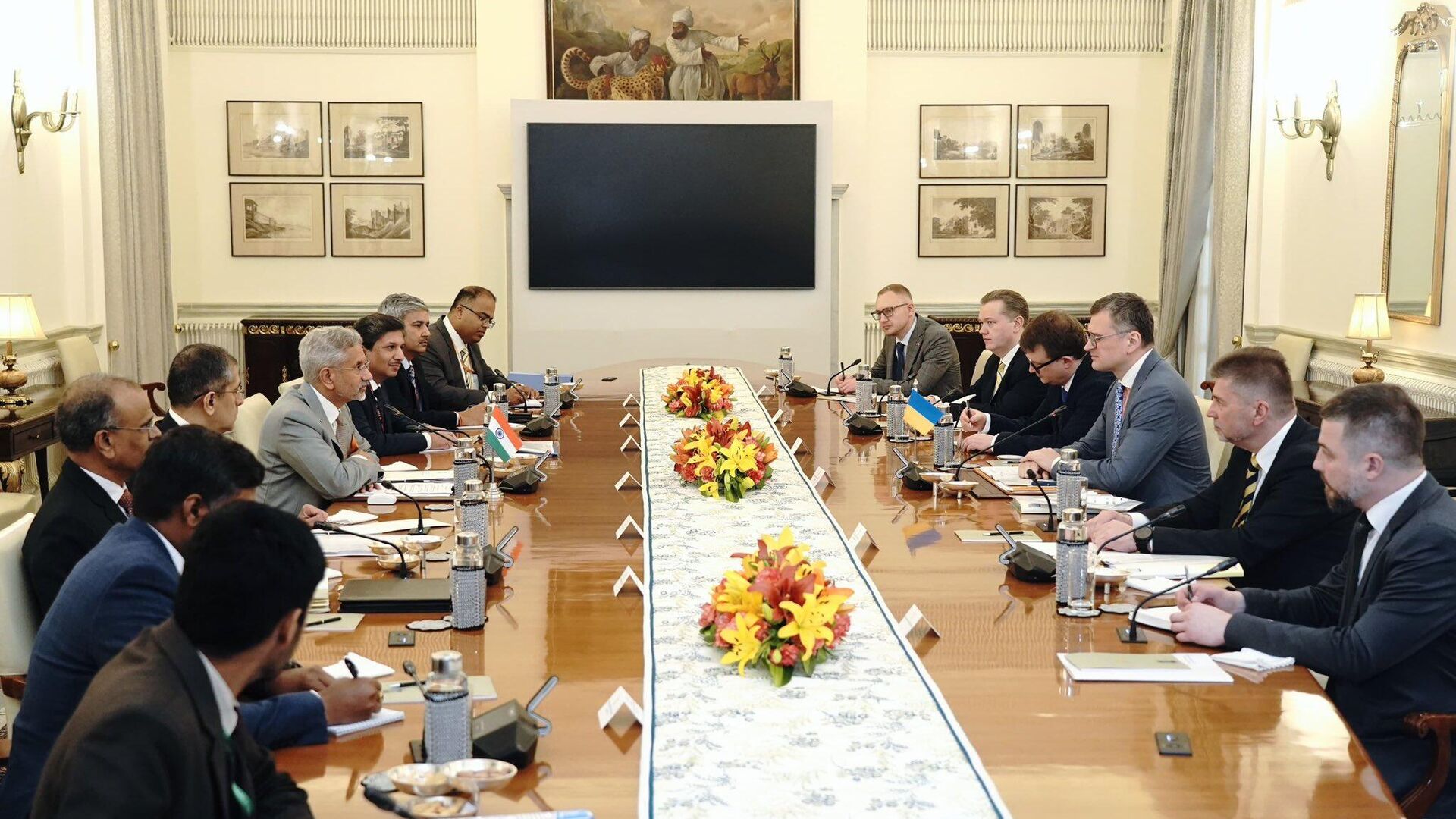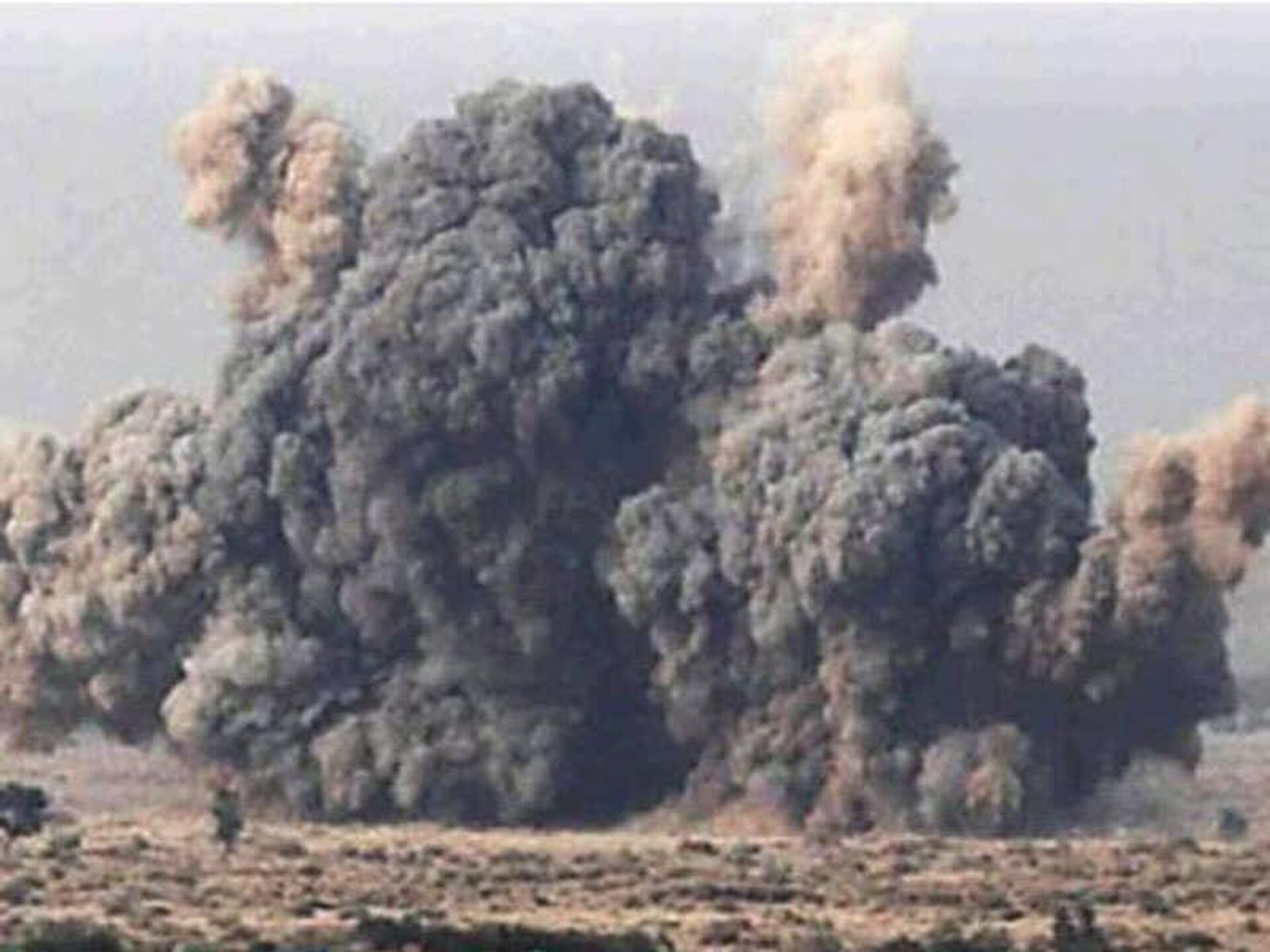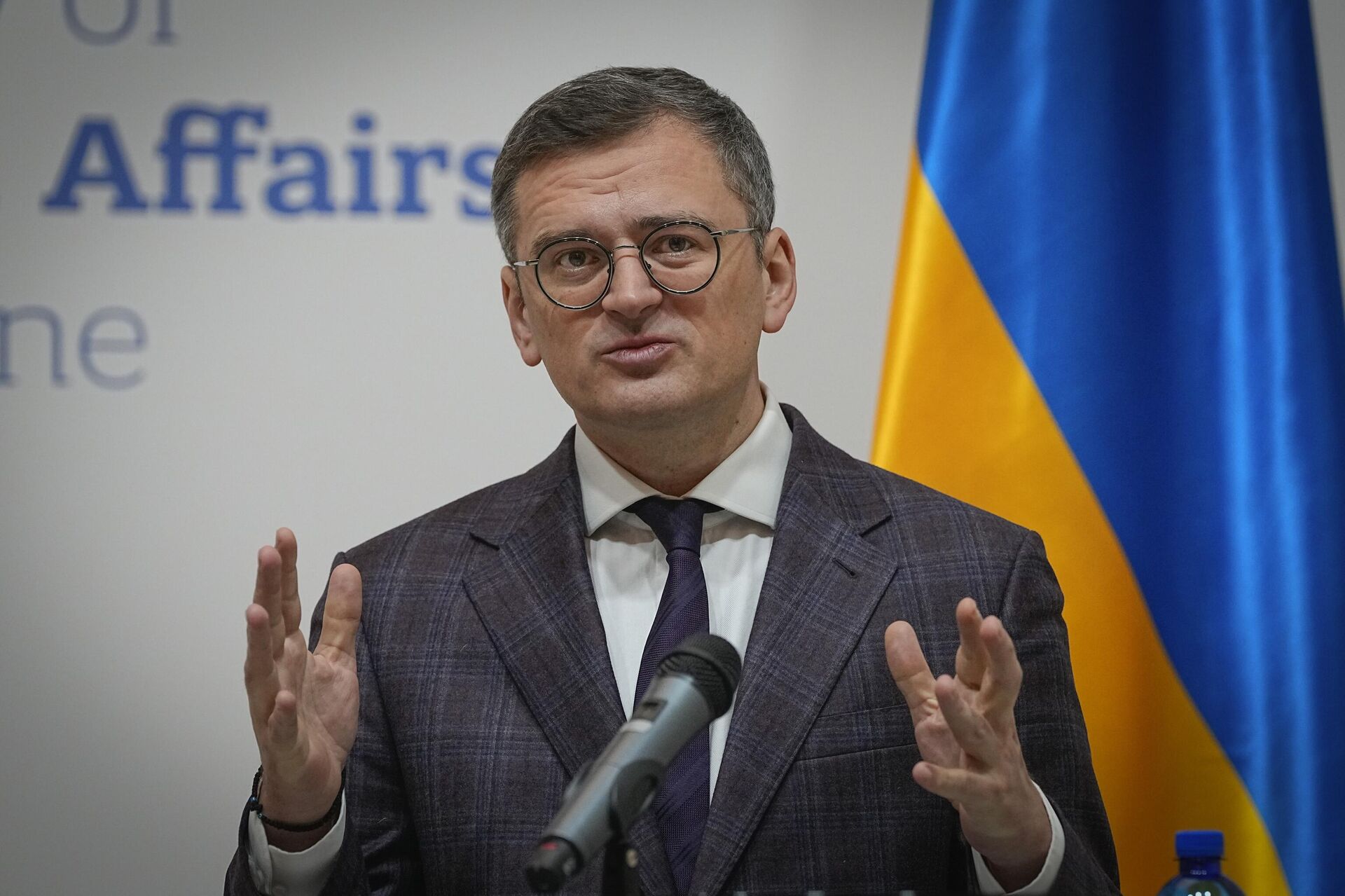https://sputniknews.in/20240407/india-ignores-ukraines-carrot--stick-approach-to-turn-it-against-russia-7068167.html
India Ignores Ukraine's Carrot & Stick Approach to Turn It Against Russia
India Ignores Ukraine's Carrot & Stick Approach to Turn It Against Russia
Sputnik India
Military analyst Vijainder K. Thakur reflects on Kuleba's unsuccessful visit and examines India's neutrality in the Ukraine conflict in his column for Sputnik... 07.04.2024, Sputnik India
2024-04-07T14:33+0530
2024-04-07T14:33+0530
2024-04-07T18:09+0530
sputnik opinion
s. jaishankar
india
russia
ukraine
rosoboronexport
mod russia
russian armed forces
defense export
defense sector
https://cdn1.img.sputniknews.in/img/07e8/04/07/7069018_0:76:2049:1228_1920x0_80_0_0_82163b9b30617272c0ae54835b44ddc2.jpg
Ukrainian Foreign Minister Dmytro Kuleba's two day visit to India on March 28, ostensibly an attempt to improve economic relations between the two nations, was in reality a brazen attempt by Ukraine to seek Indian support for its conflict with Russia.As a prelude to the visit, Kuleba told the FT that India's close ties with Russia were based on a Soviet legacy that was evaporating."The cooperation between India and Russia is largely based on the Soviet legacy, But this is not the legacy that will be kept for centuries; it is a legacy that is evaporating", Kuleba said.Following his talks in India, Kuleba told the Indian press, "We ... agreed to restore the level of cooperation between our countries that existed prior to" February 2022 "as well as identify new promising projects to take our relations to the next level."India's External Affairs Minister Jaishankar said that "our immediate goal is to get trade back to earlier levels".Clearly, Kuleba had made no headway with his blatant attempt to interfere with India's sovereign rights.India - Ukraine RelationsFollowing the unravelling of the Soviet Union in 1991, Indian relations with Ukraine largely pivoted around the supply of defence equipment and spares from Soviet defence manufacturing entities that remained in Ukraine. Spares for IAF MiG fighters and Antonov An-26 transport aircraft and engines were Talwar and successor class frigates acquired from Russia being two examples.Ukraine's decision in 1996 to supply tanks to Pakistan and its decision in 1998 to support sanctions on India, following India's nuclear weapons tests, stressed India - Ukraine relations to a breaking point. Subsequently, despite attempts by India to forge closer relations, through a high profile visit by President Abdul Kalam in June 2005, the relations between the two nations failed to acquire warmth.As such, India's relations with Ukraine are based as much on "Soviet Legacy" as India's relations with Russia. So if the Soviet legacy is fast evaporating, India's relations with Ukraine too would also be losing relevance.The fact is - India's relations with Russia are far more resilient than India's relations with Ukraine, because the strategic content of India's relations with Russia dwarf the strategic content of India's relations with Ukraine.The Real Reason for Kuleba's VisitIn an interview with NDTV, Kuleba candidly dwelt on the real purpose of the visit. He cited three reasons for his visit, none of which involved improving India - Ukraine relations.1. "We believe India can use its relations with Russia to make Russia stop" the conflict. 2. "India can play a very important role in bringing togethermore nations from the Global South.""If India sits at the table to discuss the peace formula putforward by Ukraine to find a diplomatic solution to the war.Then many other nations will feel much safer and comfortablesitting next to India."3. If India sits at the table, it would be projected as a de facto Indian condemnation of the Russian Special Military Operation (SMO), as a violation of international law.The attempted meddling in India's sovereign affairs by the Ukrainian foreign minister was truly astounding.Understanding Ukraine's 'Peace Formula'Ukraine's peace initiative is in reality a Russian surrender document, which Ukraine hopes the nations participating in the summit will force Russia to sign. Among other things, the initiative calls for the unconditional withdrawal of Russian troops from Ukrainian territory.Ukraine hopes to hold a summit on its peace-initiative without Russian participation.India's official position is that the conflict in Ukraine must be resolved through peace talks between Ukraine and Russia.India is not ready to join any peace summit that does not include Russia.The Ukrainian proposed summit is not aimed at a peaceful settlement of its dispute with Russia, it is aimed at forcing Russia to surrender, and destroying, for good, Russian ability to challenge Western hegemony in the future. Indeed, Ukraine is deeply committed to Western hegemony as a Western proxy and vassal.Terming Ukraine a US proxy and vassal isn't hyperbole, because Ukraine would cease to be a viable entity, let alone an independent state, if it was deprived of Western financial aid and weapons.Ukraine's Delusional Carrot and Stick ApproachSpeaking to the Indian press, Kuleba facetiously said Ukraine was not against cooperation between India and Russia."Our job is to convey a simple message to New Delhi," he told the Times of India. "When you decide to engage with Russia, please know the red line for Ukraine is financing Russia's war machine," Kuleba said. Pragmatically speaking, India doesn't know if there will exist a Ukraine in the near future, let alone a Ukrainian red line. So it is difficult for many Indians to understand why India should care about a Ukrainian red line.That is where the Ukrainian carrot comes in. Kuleba told the Financial Times that Ukraine was open to expanding trade and technology ties with India and would offer Indian companies a role in postwar reconstruction.Factoring in the pragmatism of the Indian people, the Ukrainian carrot also has no takers.Understanding Indian NeutralityThe fact is, India's neutrality in Ukraine's conflict with Russia is not an attempt to balance India's relations with the two nations. India's neutrality makes sense only when viewed in the context of India's relations with the US and Russia.More simply stated, India's neutrality in the Ukraine conflict balances its relations with the US and Russia, not its relations with Ukraine and Russia.ConclusionIndia has no imperative to vitiate its strategic partnership with Russia to please Ukraine or its Western sponsors.Following the start of the SMO, India's strategic partnership with Russia has acquired a new dimension - burgeoning commercial trade volumes.The initial surge in trade may be largely attributed to increased Indian imports of Russian oil but, with both the nations poised to trade exclusively using local currencies, India's trade with Russia is being reimagined.Russia, which now has a lot of Indian currency to spend, is incentivised to try and leverage India's manufacturing infrastructure to its advantage, just as the West has been doing for decades.Russia is poised to set up manufacturing units in India to export quality consumer goods to the Russian market, which has so far been dependent on Western and Chinese manufactured goods.Military cooperation between India and Russia is also being reimagined. Russia is not selling weapons to India anymore, its is cooperating with India to develop weapons. Rosoboronexport recently announced that it aims to expand technological partnerships in the global market. It "has recently successfully implemented more than ten large technological projects for the joint production of products for various branches of the armed forces, and ten more are currently being implemented."According to Rosoboronexport "forecasts, by 2030 technology contracts will account for 40% of the global market for military products, which is twice the current figures."
https://sputniknews.in/20240324/crocus-city-hall-attack-us-perfidiously-withheld-specific-intelligence-gave-clean-chit-to-ukraine-6930533.html
india
russia
ukraine
Sputnik India
feedback.hindi@sputniknews.com
+74956456601
MIA „Rossiya Segodnya“
2024
News
en_IN
Sputnik India
feedback.hindi@sputniknews.com
+74956456601
MIA „Rossiya Segodnya“
Sputnik India
feedback.hindi@sputniknews.com
+74956456601
MIA „Rossiya Segodnya“
india's stance on ukraine-russia war, ukraine-russia war latest, ukraine latest, special military operation
india's stance on ukraine-russia war, ukraine-russia war latest, ukraine latest, special military operation
India Ignores Ukraine's Carrot & Stick Approach to Turn It Against Russia
14:33 07.04.2024 (Updated: 18:09 07.04.2024) Military analyst Vijainder K. Thakur reflects on Kuleba's unsuccessful visit and examines India's neutrality in the Ukraine conflict in his column for Sputnik India.
Ukrainian Foreign Minister Dmytro Kuleba's two day visit to India on March 28, ostensibly an attempt to improve economic relations between the two nations, was in reality a brazen attempt by Ukraine to seek Indian support for its conflict with Russia.
As a prelude to the visit, Kuleba told the FT that India's close ties with Russia were based on a Soviet legacy that was evaporating.
"The cooperation between India and Russia is largely based on the Soviet legacy, But this is not the legacy that will be kept for centuries; it is a legacy that is evaporating", Kuleba said.
Following his talks in India, Kuleba told the Indian press, "We ... agreed to restore the level of cooperation between our countries that existed prior to" February 2022 "as well as identify new promising projects to take our relations to the next level."
India's External Affairs Minister Jaishankar said that "our immediate goal is to get trade back to earlier levels".
Clearly, Kuleba had made no headway with his blatant attempt to interfere with India's sovereign rights.
India - Ukraine Relations
Following the unravelling of the Soviet Union in 1991, Indian relations with Ukraine largely pivoted around the supply of defence equipment and spares from Soviet defence manufacturing entities that remained in Ukraine. Spares for IAF MiG fighters and Antonov An-26 transport aircraft and engines were Talwar and successor class frigates acquired from Russia being two examples.
Ukraine's decision in 1996 to supply tanks to Pakistan and its decision in 1998 to support sanctions on India, following
India's nuclear weapons tests, stressed India - Ukraine relations to a breaking point. Subsequently, despite attempts by India to forge closer relations, through a high profile visit by President Abdul Kalam in June 2005, the relations between the two nations failed to acquire warmth.
As such, India's relations with Ukraine are based as much on "Soviet Legacy" as India's relations with Russia. So if the Soviet legacy is fast evaporating, India's relations with Ukraine too would also be losing relevance.
The fact is - India's relations with Russia are far more resilient than India's relations with Ukraine, because the strategic content of India's relations with Russia dwarf the strategic content of India's relations with Ukraine.
The Real Reason for Kuleba's Visit
In an interview with NDTV, Kuleba candidly dwelt on the real purpose of the visit. He cited three reasons for his visit, none of which involved improving India - Ukraine relations.
1. "We believe India can use its relations with Russia to make Russia stop" the conflict.
2. "India can play a very important role in bringing together
more nations from the Global South."
"If India sits at the table to discuss the peace formula put
forward by Ukraine to find a diplomatic solution to the war.
Then many other nations will feel much safer and comfortable
sitting next to India."
3. If India sits at the table, it would be projected as a de facto Indian condemnation of the Russian Special Military Operation (SMO), as a violation of international law.
The attempted meddling in India's sovereign affairs by the Ukrainian foreign minister was truly astounding.
Understanding Ukraine's 'Peace Formula'
Ukraine's peace initiative is in reality a Russian surrender document, which Ukraine hopes the nations participating in the summit will force Russia to sign. Among other things, the initiative calls for the unconditional withdrawal of Russian troops from Ukrainian territory.
Ukraine hopes to hold a summit on its peace-initiative without Russian participation.
India's official position is that the conflict in Ukraine must be resolved through peace talks between Ukraine and Russia.
India is not ready to join any peace summit that does not include Russia.
The Ukrainian proposed summit is not aimed at a peaceful settlement of its dispute with Russia, it is aimed at forcing Russia to surrender, and destroying, for good, Russian ability to challenge Western hegemony in the future. Indeed, Ukraine is deeply committed to Western hegemony as a Western proxy and vassal.
Terming Ukraine a US proxy and vassal isn't hyperbole, because Ukraine would cease to be a viable entity, let alone an independent state, if it was deprived of Western financial aid and weapons.
Ukraine's Delusional Carrot and Stick Approach
Speaking to the Indian press, Kuleba facetiously said Ukraine was not against cooperation between India and Russia.
"Our job is to convey a simple message to New Delhi," he told the Times of India. "When you decide to engage with Russia, please know the red line for Ukraine is financing Russia's war machine," Kuleba said.
Pragmatically speaking, India doesn't know if there will exist a Ukraine in the near future, let alone a Ukrainian red line. So it is difficult for many Indians to understand why India should care about a Ukrainian red line.
That is where the Ukrainian carrot comes in. Kuleba told the Financial Times that Ukraine was open to expanding trade and technology ties with India and would offer Indian companies a role in postwar reconstruction.
Factoring in the pragmatism of the Indian people, the Ukrainian carrot also has no takers.
Understanding Indian Neutrality
The fact is, India's neutrality in Ukraine's conflict with Russia is not an attempt to balance India's relations with the two nations. India's neutrality makes sense only when viewed in the context of India's relations with the US and Russia.
More simply stated, India's neutrality in the Ukraine conflict balances its relations with the US and Russia, not its relations with Ukraine and Russia.
India has no imperative to vitiate its strategic partnership with Russia to please Ukraine or its Western sponsors.
Following the start of the SMO, India's strategic partnership with Russia has acquired a new dimension - burgeoning commercial trade volumes.
The initial surge in trade may be largely attributed to increased Indian imports of Russian oil but, with both the nations poised to trade exclusively using local currencies, India's trade with Russia is being reimagined.
Russia, which now has a lot of Indian currency to spend, is incentivised to try and leverage India's manufacturing infrastructure to its advantage, just as the West has been doing for decades.
Russia is poised to set up manufacturing units in India to export quality consumer goods to the Russian market, which has so far been dependent on Western and Chinese manufactured goods.
Military cooperation between India and Russia is also being reimagined. Russia is not selling weapons to India anymore, its is cooperating with India to develop weapons. Rosoboronexport recently announced that it aims to expand technological partnerships in the global market. It "has recently successfully implemented more than ten large technological projects for the joint production of products for various branches of the armed forces, and ten more are currently being implemented."
According to Rosoboronexport "forecasts, by 2030 technology contracts will account for 40% of the global market for military products, which is twice the current figures."




